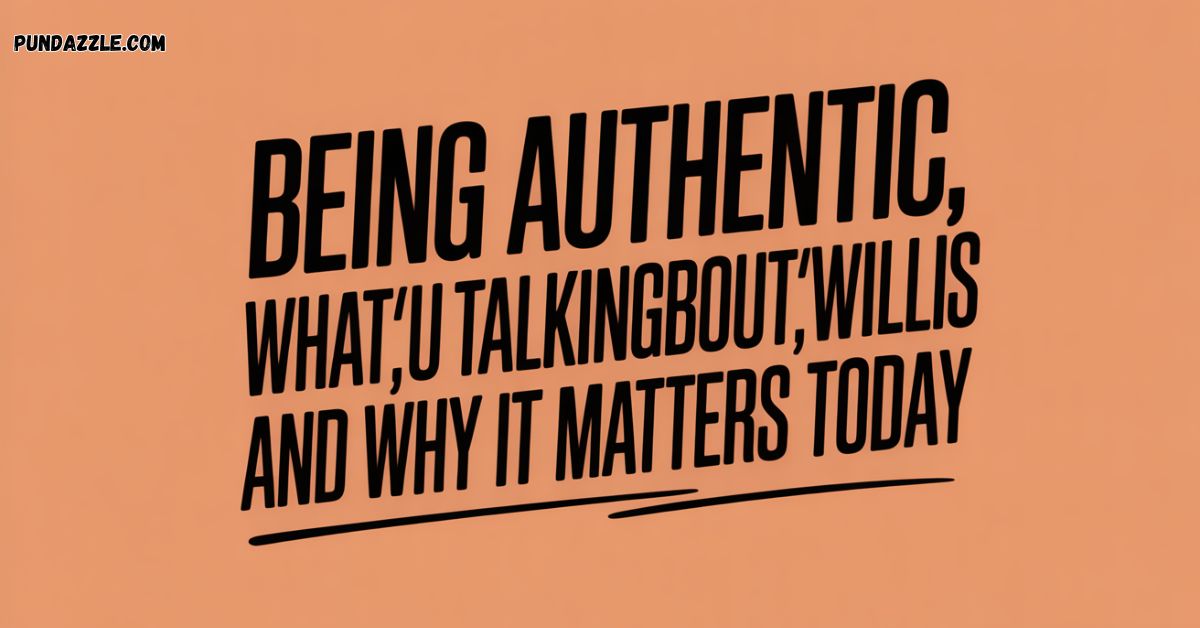In a world saturated with filters and curated personas, the concept of being authentic has never been more crucial. The phrase “WhatUTalkingBoutWillis” encapsulates a cultural shift towards valuing realness over a polished facade.
This article delves deep into the significance of authenticity in today’s society, exploring its personal, social, and emotional dimensions.
The Essence of Authenticity
Authenticity is more than just a catchphrase; it’s a personal commitment to expressing your genuine self and living in alignment with your values. As we navigate the complexities of life, the call to be true to ourselves grows louder.
Why Authenticity Matters
Living authentically fosters deeper connections with others. When you embrace your true self, you invite others to do the same, creating an environment of trust and honesty.
In contrast, inauthenticity often leads to feelings of isolation and anxiety, as you may constantly feel the pressure to conform to societal expectations.
Being Authentic: More Than Just a Buzzword
Historically, authenticity has been a revered trait. In today’s digital landscape, the definition has evolved.
Once a hallmark of personal integrity, authenticity now faces challenges from social media and the relentless pursuit of external validation.
The Evolution of Authenticity
- Pre-Digital Age: Authenticity centered around face-to-face interactions and community ties.
- Digital Age: With platforms like Instagram and TikTok, authenticity often gets overshadowed by algorithm-driven content that prioritizes engagement over truth.
Real-World Examples
Consider influencers who prioritize honest communication over a polished image. Their followers often find genuine connection in their vulnerability, which fosters a loyal and engaged audience.
Also read: Is Zikzoutyqulsis Bad? Find Out The Truth Before You Click
Authenticity as a Personal Standard
Holding yourself to an authentic standard means committing to self-awareness and emotional honesty. It requires constant self-reflection and an understanding of your personal values.
Steps to Cultivating Authenticity
- Self-Awareness: Regularly assess your thoughts, feelings, and behaviors. Journaling can be an effective tool for this.
- Embrace Vulnerability: Share your struggles and triumphs. Vulnerability is not weakness; it’s a strength that fosters connection.
- Self-Acceptance: Accept your flaws and limitations. Remember, no one is perfect.
The Rise of Authenticity in a Filtered World
In a filtered world, where fake culture often reigns, the demand for authenticity is rising. People are increasingly drawn to raw storytelling and truthful living.
The Impact of Social Media
Research shows that users crave real experiences over highly curated content. According to a study by Google, 70% of consumers prefer to engage with brands that showcase authenticity in their messaging.
The Anti-Filter Movement
The no filter movement is gaining traction, encouraging individuals to reject fake personas and embrace their true selves. This cultural shift is evident in the rise of authentic influencers who prioritize transparency and honesty in their content.
Challenges of Staying Real
Despite the growing trend towards authenticity, many face significant challenges in maintaining their true selves.
Common Struggles
- Social Pressure: The desire for acceptance can lead to inauthentic behavior, where individuals feel compelled to conform to societal norms.
- Fear of Judgment: Many fear that being their true selves will lead to criticism or rejection.
Overcoming Challenges
To combat these pressures, practice self-trust and surround yourself with supportive individuals who encourage your individuality.
The Power of Being Authentic: Benefits and Impact
The benefits of embracing authenticity are profound.
Personal Advantages
- Emotional Freedom: Being authentic allows for inner peace and reduces anxiety associated with maintaining a facade.
- Stronger Relationships: Authentic interactions foster trust and deeper connections, enhancing both personal and professional relationships.
Professional Benefits
In the workplace, authenticity can lead to increased productivity and job satisfaction. Employees who feel they can express their true selves are more engaged and committed to their roles.
Also read: Money BetterThisWorld: Master Your Financial Journey
Practical Strategies for Practicing Authenticity Daily
Incorporating authenticity into your daily life doesn’t have to be overwhelming. Here are some practical tips:
Tips for Daily Authenticity
- Practice Honest Communication: Share your thoughts openly, even when it’s uncomfortable.
- Reflect Regularly: Spend time each week assessing your actions and thoughts to ensure they align with your core values.
- Engage with Your Community: Build connections with others who value authentic living.
Mindfulness Techniques
Mindfulness can enhance self-awareness and promote an authentic mindset. Consider practices like meditation or yoga to center yourself and connect with your inner truth.
Why People Are Drawn to Realness
The appeal of authenticity lies in its relatability. People crave genuine connection and real stories.
Psychological Insights
Studies indicate that authenticity enhances emotional intelligence and fosters trust. When individuals express their true selves, they cultivate environments where others feel safe to do the same.
Cultural Resonance
In an era dominated by filtered images and curated lives, audiences resonate more with those who showcase their vulnerability and honesty. This cultural shift towards authentic storytelling is changing how we perceive success and fulfillment.
Final Thoughts: Embracing Authenticity in a World That Often Prefers Facades
As we navigate the complexities of modern life, the importance of living authentically cannot be overstated. Embracing your true self not only benefits you but also contributes to a more honest and connected society.
The Call to Action
As you reflect on your own journey towards authenticity, consider how you can live your truth each day. Whether it’s through authentic communication, embracing vulnerability, or prioritizing self-acceptance, every step you take moves you closer to a life of emotional freedom and inner peace.
FAQs: Addressing Common Questions About Authenticity
What does it mean to be authentic?
Being authentic means being true to your genuine self, expressing your thoughts and feelings honestly, and aligning your actions with your values.
How can I become more authentic?
To cultivate authenticity, practice self-awareness, embrace vulnerability, and engage in open communication with others.
What are the risks of being authentic?
While being authentic can lead to rejection or criticism, it also fosters deeper connections and a sense of belonging, ultimately enhancing your well-being.
How does authenticity affect relationships?
Authenticity builds trust and encourages open communication, leading to stronger and more meaningful relationships.
WhatUTalkingBoutWillis: How does it relate to authenticity?
“WhatUTalkingBoutWillis” serves as a cultural reference promoting the importance of realness in a world often dominated by performance and polished images.
Read more knowledgeable blogs on Pun Dazzle

Philipp Engel is a passionate writer and pun lover dedicated to spreading laughter and joy through words. As the creator and author of the website Philipp Engel, he delivers a delightful mix of puns, jokes, and playful humor that entertains readers of all ages. With a sharp wit and a deep love for language, Philipp aims to brighten every visitor’s day with clever wordplay and a smile, making humor a universal language that connects people everywhere.














